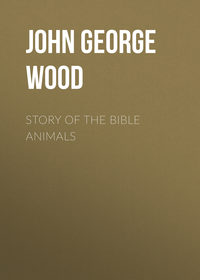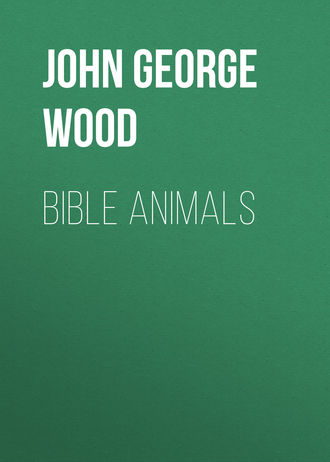 полная версия
полная версияBible Animals
We lose much of the real force of the Scriptures, if we do not possess some notion of the manners and customs of Palestine and the neighbouring countries, as well as of the tone of mind prevalent among the inhabitants. In our own country, that any one should be eaten by dogs would be a fate so contrary to usage, that we can hardly conceive its possibility, and such a fate would be out of the ordinary course of events. But, if such a fate should happen to befall any one, we should have no stronger feeling of pity than the natural regret that the dead person was not buried with Christian rites.
But, with the inhabitants of Palestine, such an event was by no means unlikely. It was, and is still, the custom to bury the corpse almost as soon as life has departed, and such would ordinarily have been the case with the dead body of Jezebel. But, through fear of the merciless Jehu, by whose command she had been flung from the window of her own palace, no one dared to remove her mangled body. The dogs, therefore, seized upon their prey; and, even before Jehu had risen from the banquet with which he celebrated his deed, nothing was left of the body but the skull, the feet, and the hands.
In Mr. Tristram's work, the author has recognised the true dog nature, though concealed behind an uninviting form: "Our watch-dog, Beirût, attached himself instinctively to Wilhelm, though his canine instinct soon taught him to recognise every one of our party of fourteen, and to cling to the tents, whether in motion or at rest, as his home. Poor Beirût! though the veriest pariah in appearance, thy plebeian form encased as noble a dog-heart as ever beat at the sound of a stealthy step."
The same author records a very remarkable example of the sagacity of the native Dog, and the fidelity with which it will keep guard over the property of its master. "The guard-house provided us, unasked, with an invaluable and vigilant sentry, who was never relieved, nor ever quitted the post of duty. The poor Turkish conscript, like every other soldier in the world, is fond of pets, and in front of the grim turret that served for a guard-house was a collection of old orange-boxes and crates, thickly peopled with a garrison of dogs of low degree, whose attachment to the spot was certainly not purchased by the loaves and fishes which fell to their lot.
"One of the family must indeed have had hard times, for she had a family of no less than five dependent on her exertions, and on the superfluities of the sentries' mess. With a sagacity almost more than canine, the poor gaunt creature had scarcely seen our tents pitched before she came over with all her litter and deposited them in front of our tent. At once she scanned the features of every member of the encampment, and introduced herself to our notice. During the week of our stay, she never quitted her post, or attempted any depredation on our kitchen-tent, which might have led to her banishment. Night and day she proved a faithful and vigilant sentry, permitting no stranger, human or canine, European or Oriental, to approach the tents without permission, but keeping on the most familiar terms with ourselves and our servants.
"On the morning of our departure, no sooner had she seen our camp struck, than she conveyed her puppies back to their old quarters in the orange-box, and no intreaties or bribes could induce her to accompany us. On three subsequent visits to Jerusalem, the same dog acted in a similar way, though no longer embarrassed by family cares, and would on no account permit any strange dog, nor even her companions at the guard-house, to approach within the tent ropes."
After perusing this account of the Dog of Palestine, two points strike the reader. The first is the manner in which the Dog, in spite of all the social disadvantages under which it labours, displays one of the chief characteristics of canine nature, namely, the yearning after human society. The animal in question had already attached herself to the guard-house, where she could meet with some sort of human converse, though the inborn prejudices of the Moslem would prevent the soldiers from inviting her to associate with them, as would certainly have been done by European soldiers. She nestled undisturbed in the orange-box, and, safe under the protection of the guard, brought up her young family in their immediate neighbourhood. But, as soon as Europeans arrived, her instinct told her that they would be closer associates than the Turkish soldiers who were quartered in the guard-house, and accordingly she removed herself and her family to the shelter of their tents.
Herein she carried out the leading principle of a dog's nature. A dog must have a master, or at all events a mistress, and just in proportion as he is free from human control, does he become less dog-like and more wolf-like. In fact, familiar intercourse with mankind is an essential part of a dogs true character, and the animal seems to be so well aware of this fact, that he will always contrive to find a master of some sort, and will endure a life of cruel treatment at the hands of a brutal owner rather than have no master at all.
The second point in this account is the singular local instinct which characterises the Dogs of Palestine and other eastern countries, and which is as much inbred in them as the faculty of marking game in the pointer, the combative nature in the bulldog, the exquisite scent in the bloodhound, and the love of water in the Newfoundland dog. In England, we fancy that the love of locality belongs especially to the cat, and that the Dog cares little for place, and much for man. But, in this case, we find that the local instinct overpowered the yearning for human society. Fond as was this dog of her newly-found friends, and faithful as she was in her self-imposed service, she would not follow them away from the spot where she had been born, and where she had produced her own young.
This curious love for locality has evidently been derived from the traditional custom of successive generations, which has passed from the realm of reason into that of instinct. The reader will remember that Sig. Pierotti mentions an instance where the dogs which he had been accustomed to feed would follow him as far as the limits of their particular district, but would go no farther. The late Albert Smith, in his "Month at Constantinople," gives a similar example of this characteristic. He first describes the general habits of the dogs.
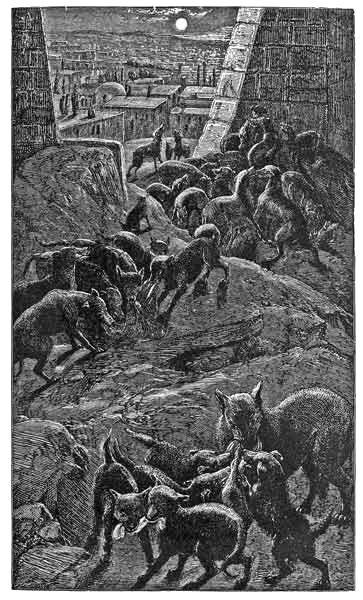
"At evening let them return; and let them make a noise like a dog, and go round about the city. Let them wander up and down for meat, and grudge if they be not satisfied"—Psalm lix. 14, 15.
On the first night of his arrival, he could not sleep, and went to the window to look out in the night. "The noise I heard then I shall never forget. To say that if all the sheep-dogs, in going to Smithfield on a market-day, had been kept on the constant bark, and pitted against the yelping curs upon all the carts in London, they could have given any idea of the canine uproar that now first astonished me, would be to make the feeblest of images. The whole city rang with one vast riot. Down below me, at Tophané—over-about Stamboul—far away at Scutari—the whole sixty thousand dogs that are said to overrun Constantinople appeared engaged in the most active extermination of each other, without a moment's cessation. The yelping, howling, barking, growling, and snarling, were all merged into one uniform and continuous even sound, as the noise of frogs becomes when heard at a distance. For hours there was no lull. I went to sleep, and woke again, and still, with my windows open, I heard the same tumult going on; nor was it until daybreak that anything like tranquillity was restored.
"Going out in the daytime, it is not difficult to find traces of the fights of the night about the limbs of all the street dogs. There is not one, among their vast number, in the possession of a perfect skin. Some have their ears gnawed away or pulled off; others have their eyes taken out; from the backs and haunches of others perfect steaks of flesh had been torn away; and all bear the scars of desperate combats.
"Wild and desperate as is their nature, these poor animals are susceptible of kindness. If a scrap of bread is thrown to one of them now and then, he does not forget it; for they have, at times, a hard matter to live—not the dogs amongst the shops of Galata or Stamboul, but those whose 'parish' lies in the large burying-grounds and desert places without the city; for each keeps, or rather is kept, to his district, and if he chanced to venture into a strange one, the odds against his return would be very large. One battered old animal, to whom I used occasionally to toss a scrap of food, always followed me from the hotel to the cross street in Pera, where the two soldiers stood on guard, but would never come beyond this point. He knew the fate that awaited him had he done so; and therefore, when I left him, he would lie down in the road, and go to sleep until I came back.
"When a horse or camel dies, and is left about the roads near the city, the bones are soon picked very clean by these dogs, and they will carry the skulls or pelves to great distances. I was told that they will eat their dead fellows—a curious fact, I believe, in canine economy. They are always troublesome, not to say dangerous, at night; and are especially irritated by Europeans, whom they will single out amongst a crowd of Levantines."
In the same work there is a short description of a solitary dervish, who had made his home in the hollow of a large plane-tree, in front of which he sat, surrounded by a small fence of stakes only a foot or so in height. Around him, but not venturing within the fence, were a number of gaunt, half-starved dogs, who prowled about him in hopes of having an occasional morsel of food thrown to them. Solitary as he was, and scanty as must have been the nourishment which he could afford to them, the innate trustfulness of the dog-nature induced them to attach themselves to human society of some sort, though their master was one, and they were many—he was poor, and they were hungry.
Once in the Scriptures the word Greyhound occurs, namely, in Prov. xxx. 29-31: "There be three things which go well, yea, four are comely in going: a lion, which is strongest among beasts, and turneth not away for any; a greyhound; an he-goat also; and a king, against whom there is no rising up." But the word "Greyhound" is only employed conjecturally, inasmuch as the signification of the Hebrew word Zarzir-mathnâim is "one girt about the loins." Some commentators have thought that the horse might be signified by this word, and that the girding about the loins referred to the trappings with which all Easterns love to decorate their steeds. Probably, however, the word in question refers neither to a horse nor a dog, but to a human athlete, or wrestler, stripped, and girt about the loins ready for the contest.
THE WOLF
Identity of the animal indisputable—its numbers, past and present—The Wolf never mentioned directly—its general habits—References in Scripture—its mingled ferocity and cowardice—its association into packs—The Wolf's bite—How it takes its prey—its ravages among the flocks—Allusions to this habit—The shepherd and his nightly enemies—Mr. Tristram and the Wolf—A semi-tamed Wolf at Marsaba.
There is no doubt that the Hebrew word Zeëb, which occurs in a few passages of the Old Testament, is rightly translated as Wolf, and signifies the same animal as is frequently mentioned in the New Testament.
This fierce and dangerous animal was formerly very plentiful in Palestine, but is now much less common, owing to the same causes which have extirpated the lion from the country. It is a rather remarkable fact, that in no passage of Holy Writ is the Wolf directly mentioned. Its name is used as a symbol of a fierce and treacherous enemy, but neither in the Old nor New Testament does any sacred writer mention any act as performed by the Wolf. We have already heard of the lion which attacked Samson and was killed by him, of the lion which slew the disobedient prophet, and of the lions which spared Daniel when thrown into their den. We also read of the dogs which licked Ahab's blood, and ate the body of Jezebel, also of the bears which tore the mocking children.
But in no case is the Wolf mentioned, except in a metaphorical sense; and this fact is the more remarkable, because the animals were so numerous that they were very likely to have exercised some influence on a history extending over such a lengthened range of years, and limited to so small a portion of the earth. Yet we never hear of the Wolf attacking any of the personages mentioned in Scripture; and although we are told of the exploit of David, who pursued a lion and a bear that had taken a lamb out of his fold, we are never told of any similar deed in connexion with the Wolf.
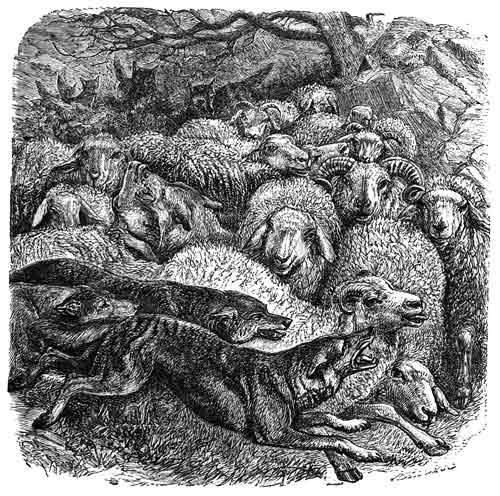
THE WOLF.
"The wolf catcheth and scattereth the sheep"—John x. 12.
This animal was then what it is now. Seldom seen by day, it lies hidden in its covert as long as the light lasts, and steals out in search of prey in the evening. This custom of the Wolf is mentioned in several passages of Holy Scripture, such as that in Jer. v. 5, 6: "These have altogether broken the yoke, and burst the bonds. Wherefore a lion out of the forest shall slay them, and a wolf of the evenings shall spoil them." In this passage the reader will see that the rebellious Israelites are compared to restive draught cattle which have broken away from their harness and run loose, so that they are deprived of the protection of their owners, and exposed to the fury of wild beasts. A similar reference is made in Hab. i. 8: "Their horses also are swifter than the leopards, and are more fierce than the evening wolves." The same habit of the Wolf is alluded to in Zeph. iii. 3: "Her princes within her are roaring lions; her judges are evening wolves."
Individually, the Wolf is rather a timid animal. It will avoid a man rather than meet him. It prefers to steal upon its prey and take it unawares, rather than to seize it openly and boldly. It is ever suspicious of treachery, and is always imagining that a trap is laid for it. Even the shallow device of a few yards of rope trailing from any object, or a strip of cloth fluttering in the breeze, is quite sufficient to keep the Wolf at bay for a considerable time. This fact is well known to hunters, who are accustomed to secure the body of a slain deer by simply tying a strip of cloth to its horn. If taken in a trap of any kind, or even if it fancies itself in an enclosure from which it can find no egress, it loses all courage, and will submit to be killed without offering the least resistance. It will occasionally endeavour to effect its escape by feigning death, and has more than once been known to succeed in this device.
But, collectively, the Wolf is one of the most dangerous animals that can be found. Herding together in droves when pressed by hunger, the wolves will openly hunt prey, performing this task as perfectly as a pack of trained hounds. Full of wiles themselves, they are craftily wise in anticipating the wiles of the animals which they pursue; and even in full chase, while the body of the pack is following on the footsteps of the flying animal, one or two are detached on the flanks, so as to cut it off if it should attempt to escape by doubling on its pursuers.
There is no animal which a herd of wolves will not attack, and very few which they will not ultimately secure. Strength avails nothing against the numbers of these savage foes, which give no moment of rest, but incessantly assail their antagonist, dashing by instinct at those parts of the body which can be least protected, and lacerating with their peculiar short, snapping bite. Should several of their number be killed or disabled, it makes no difference to the wolves, except that a minute or two are wasted in devouring their slain or wounded brethren, and they only return to the attack the more excited by the taste of blood. Swiftness of foot avails nothing against the tireless perseverance of the wolves, who press on in their peculiar, long, slinging gallop, and in the end are sure to tire out the swifter footed but less enduring animal that flees before them. The stately buffalo is conquered by the ceaseless assaults of the wolves; the bear has been forced to succumb to them, and the fleet-footed stag finds his swift limbs powerless to escape the pursuing band, and his branching horns unable to resist their furious onset when once they overtake him.
In the passage from Habakkuk which has already been quoted, allusion is made to the ferocity of the Wolf, and the same characteristic is mentioned in several other parts of Scripture. Take, for example, Gen. xlix. 27: "Benjamin shall ravin as a wolf: in the morning he shall devour the prey, and at night he shall divide the spoil." Or the passage in Ezekiel xxii. 27: "Her princes in the midst thereof are like wolves ravening the prey, to shed blood." Or the well-known metaphor of our Lord in Matt. vii. 15: "Beware of false prophets, which come to you in sheep's clothing, but inwardly they are ravening wolves."
That the Wolf is a special enemy to the sheep-fold is shown in many parts of the Scriptures, both in the Old and New Testaments, especially in the latter. In John x. 1-16, Jesus compares himself to a good shepherd, who watches over the fold, and, if the wolves should come to take the sheep, would rather give up His life than they should succeed. But the false teachers are compared to bad shepherds, hired for money, but having no interest in the sheep, and who therefore will not expose themselves to danger in defence of their charge.
This metaphor was far more effective in Palestine, and at that time, than it is in this country and at the present day. In this land, the shepherd has no anxiety about the inroads of wild beasts, but in Palestine one of his chief cares was to keep watch at night lest the wolves should attack the fold, and to drive them away himself in case they should do so. Therefore the shepherd's life was one which involved no small danger as well as anxiety, and the metaphor used by our Lord gains additional force from the knowledge of this fact.
A similar metaphor is used when Jesus wished to express in forcible terms the dangers to which the chosen seventy would oft be subjected, and the impossibility that they should be able to overcome the many perils with which they would be surrounded. "Go your ways: behold, I send you forth as lambs among wolves" (Luke x. 3).
The well-known fact of the ravages of wolves among sheep has been employed by the prophet Isaiah in two passages, wherein he foretells the peaceful state of the world when the kingdom of the Messiah shall have been established: "The wolf also shall dwell with the lamb, and the leopard shall lie down with the kid; and the calf and the young lion and the fatling together; and a little child shall lead them" (Is. xi. 6). The second passage occurs in chapter lxv. 23-25, and is of a similar character: "They shall not labour in vain, nor bring forth for trouble; for they are the seed of the blessed of the Lord, and their offspring with them. And it shall come to pass, that before they call, I will answer; and while they are yet speaking, I will hear. The wolf and the lamb shall feed together, and the lion shall eat straw like the bullock: and dust shall be the serpent's meat. They shall not hurt nor destroy in all my holy mountain, saith the Lord."
Mr. Tristram several times met wolves while he was engaged in his travels, and mostly saw solitary specimens. One such encounter took place in the wilderness of Judah: "On my way back, I met a fine solitary wolf, who watched me very coolly, at the distance of sixty yards, while I drew my charge and dropped a bullet down the barrel. Though I sent the ball into a rock between his legs as he stood looking at me in the wady, he was not sufficiently alarmed to do more than move on a little more quickly, ever and anon turning to look at me, while gradually increasing his distance. Darkness compelled me to desist from the chase, when he quietly turned and followed me at a respectful distance. He was a magnificent animal, larger than any European wolf, and of a much lighter colour."
Those who are acquainted with the character of the animal will appreciate the truthfulness of this description. The cautious prowl at a distance, the slow trot away when he fancied he might be attacked, the reverted look, and the final turning back and following at a respectful distance, are all characteristic traits of the Wolf, no matter to what species it may belong, nor what country it may inhabit.
On another occasion, while riding in the open plain of Gennesaret, the horse leaped over the bank of a little ditch, barely three feet in depth. After the horse had passed, and not until then, a Wolf started out of the ditch, literally from under the horse's hoofs, and ran off. The animal had been crouching under the little bank, evidently watching for some cows and calves which were grazing at a short distance, under the charge of a Bedouin boy. The same author mentions that one of the monks belonging to the monastery at Marsaba had contrived to render a Wolf almost tame. Every evening at six o'clock the Wolf came regularly across the ravine, had a piece of bread, and then went back again. With the peculiar jealousy of all tamed animals, the Wolf would not suffer any of his companions to partake of his good fortune. Several of them would sometimes accompany him, but as soon as they came under the wall of the monastery he always drove them away.
The inhabitants of Palestine say that the Wolves of that country are not gregarious, and that they hunt singly, or at most in little packs of few in number. Still they dread the animal exceedingly, and say that one Wolf will do more damage in a flock of sheep than a whole pack of jackals.
As a general rule, the Syrian wolf, like the Syrian bear, is of a lighter colour than its European relatives, and appears to be a larger and stronger animal.
THE FOX OR JACKAL
The two animals comprehended under one name—The Jackal—its numbers in ancient and modern Palestine—General habits of the Jackal—Localities where the Jackal is found—Samson, and the three hundred "foxes"—Popular objections to the narrative—The required number easily obtained—Signor Pierotti's remarks upon the Jackal—An unpleasant position—How the fields were set on fire—The dread of fire inherent in wild beasts—The truth of the narrative proved—The Fox and Jackal destructive among grapes—Allusions to the Fox in the New Testament—Partially tamed Foxes.
There are several passages in the Old Testament in which the word Fox occurs, and it is almost certain that the Hebrew word Shuâl, which is rendered in our translation as Fox, is used rather loosely, and refers in some places to the Jackal, and in others to the Fox. We will first take those passages in which the former rendering of the word is evidently the right one, and will begin by examining those characteristics of the animal which afford grounds for such an assertion.
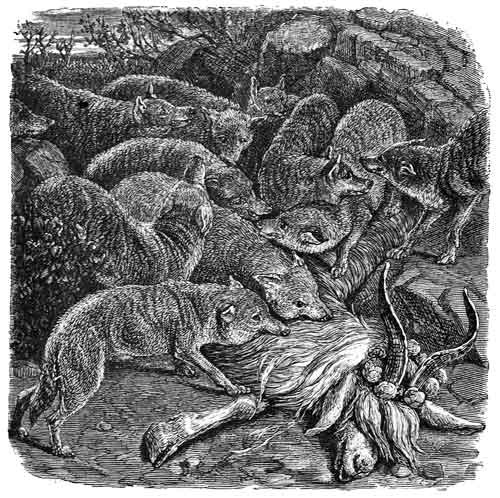
THE FOX OR JACKAL.
"They shall be a portion for foxes."—Psalm ixiii. 10. The end of the Scape Goat.
Even at the present time, the Jackal is extremely plentiful in Palestine; and as the numbers of wild beasts have much decreased in modern days, the animals must have been even more numerous than they are at present. It is an essentially nocturnal and gregarious animal. During the whole of the day the Jackals lie concealed in their holes or hiding-places, which are usually cavities in the rocks, in tombs, or among ruins. At nightfall they issue from their dens, and form themselves into packs, often consisting of several hundred individuals, and prowl about in search of food. Carrion of various kinds forms their chief subsistence, and they perform in the country much the same task as is fulfilled by the dogs in the cities.
If any animal should be killed, or even severely wounded, the Jackals are sure to find it out and to devour it before the daybreak. They will scent out the track of the hunter, and feed upon the offal of the beasts which he has slain. If the body of a human being were to be left on the ground, the Jackals would certainly leave but little traces of it; and in the olden times of warfare, they must have held high revelry in the battle-field after the armies had retired. It is to this propensity of the Jackal that David refers—himself a man of war, who had fought on many a battle-field, and must have seen the carcases of the slain mangled by these nocturnal prowlers: "Those that seek my soul, to destroy it, shall go into the lower parts of the earth. They shall fall by the sword; they shall be a portion for foxes" (Ps. lxiii. 9, 10). Being wild beasts, afraid of man, and too cowardly to attack him even when rendered furious by hunger, and powerful by force of numbers, they keep aloof from towns and cities, and live in the uninhabited parts of the country. Therefore the prophet Jeremiah, in his Book of Lamentations, makes use of the following forcible image, when deploring the pitiful state into which Judæa had fallen: "For this our heart is faint; for these things our eyes are dim: because of the mountain of Zion, which is desolate, the foxes walk upon it" (Lam. v. 17). And Ezekiel makes use of a similar image: "O Israel, thy prophets are like foxes in the desert."


